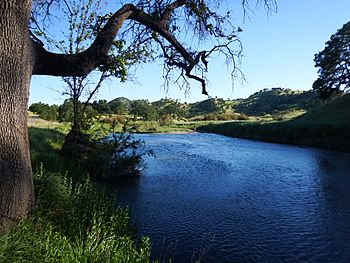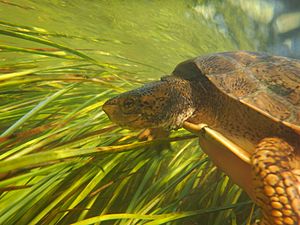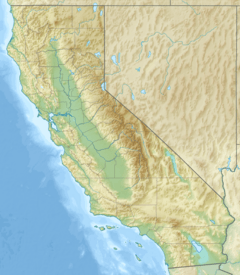Bear Creek (Colusa County) facts for kids
Quick facts for kids Bear Creek |
|
|---|---|

Bear Creek as it flows through the Bureau of Land Management's Cache Creek Natural Area
|
|
|
Location of the river mouth in California
|
|
| Country | United States |
| State | California |
| Region | Colusa County (Cache Creek Watershed) |
| Physical characteristics | |
| Main source | Mill Creek (Mendocino National Forest) 3,830 ft (1,170 m) |
| 2nd source | Bear Creek 2,212 ft (674 m) |
| River mouth | Cache Creek Cache Creek Canyon 641 ft (195 m) 38°55′35″N 122°20′0″W / 38.92639°N 122.33333°W |
| Length | 30 mi (48 km) |
| Basin features | |
| Basin size | 130 sq mi (340 km2) |
| Tributaries |
|
Bear Creek is an important stream in California, United States. It is one of two main streams that flow into a bigger creek called Cache Creek. The other main stream is the North Fork of Cache Creek.
Bear Creek is special because it is the only major stream flowing into Cache Creek that does not have a dam built on it. Other parts of Cache Creek and its other main stream, the North Fork, do have dams.
The California Office of Environmental Health Hazard Assessment suggests that people should not eat fish or shellfish from Bear Creek. This is because of high levels of a substance called mercury found in the fish.
What is the Bear Creek Watershed?
A watershed is an area of land where all the water drains into a single river or stream. The Bear Creek watershed covers about 130 square miles (337 square kilometers).
Bear Creek starts in a place called Bear Valley. It flows south for about 25 miles (40 km). The creek is located entirely within Colusa County, in the lower parts of the Inner Coast Ranges. Bear Creek ends when it joins Cache Creek in Cache Creek Canyon, just before crossing into Yolo County.
What Animals Live in Bear Creek?

Bear Creek has water all year round, which makes it a great home for many animals. Fish can swim and live in the creek throughout the year. The most common fish you will find here is the native California roach.
The creek also provides a home for many other creatures. These include amphibians like the Western pond turtle and other animals that live in water. Because Bear Creek always has water, it is a reliable source of drinking water for larger animals too. This attracts big mammals like deer and the native California Tule elk.
 | Delilah Pierce |
 | Gordon Parks |
 | Augusta Savage |
 | Charles Ethan Porter |


